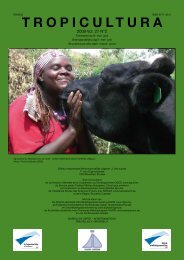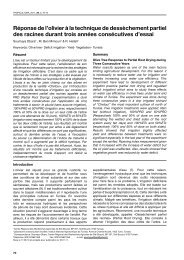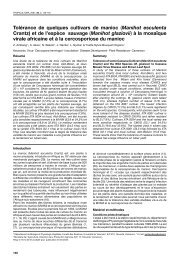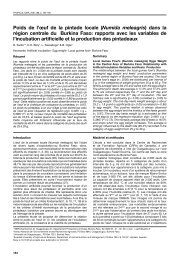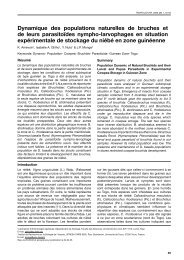Fascicule entier - Tropicultura
Fascicule entier - Tropicultura
Fascicule entier - Tropicultura
You also want an ePaper? Increase the reach of your titles
YUMPU automatically turns print PDFs into web optimized ePapers that Google loves.
TROPICULTURA, 2009, 27, 3, 191-192<br />
LES ACTIONS DE LA DGCD DE ACTIVITEITEN VAN DE DGOS<br />
DGDC’S ACTIVITIES LAS ACTIVIDADES DEL DGCD<br />
Development Cooperation Prize<br />
The Development Cooperation Prize is annual incentive prize - financed by the Belgian Development Cooperation<br />
(DGDC) and organized by the Royal Museum for Central Africa - for students and young researchers, from Belgium or<br />
developing countries, whatever their discipline. The prize is awarded to scientific works that contribute significantly<br />
to knowledge that can be applied to development in the South. Sustainable development is to be their principal aim<br />
and poverty alleviation a priority. The prizes are attributed to Bachelor’s and Master’s theses, postgraduate papers,<br />
Ph.D. theses, or publications in scientific journals.<br />
In the course of the years of the prize existence, the fields represented among the participants has remained more or<br />
less stable: the majority of files represent the exact sciences - with a very large share originating from the agricultural<br />
and applied biological sciences, followed by the human sciences and biomedical and veterinary sciences.<br />
The prize is granted to maximum 14 students and 6 researchers and consists of an award of 1,250 € for students<br />
and 2,500 € for young researchers. Since 1998 the awards have been handed over by the Minister for Development<br />
Cooperation during a ceremony in the Royal Museum for Central Africa. The laureates from abroad are invited to<br />
Belgium especially for this occasion. Many use their stay in Belgium to establish or renew contacts with the Belgian<br />
academia in their fields of interest.<br />
Two abstracts regarding the accomplishment of laureates from Cameroon and Bolivia awarded in 2007 are presented<br />
below.<br />
Morphological Characterization and Sensitivity of Four<br />
Strains of Aspergillus niger to Three Cameroonian Essential<br />
Oils<br />
Thierry Elvis Djonkack*<br />
The people of Cameroon are faced with the problem that their maize and peanut harvests are contaminated<br />
by pathogenic Aspergillus niger fungi, also called black rot. This contamination causes loss of harvest and the<br />
production of mycotoxins, which are harmful to health.<br />
The toxicity of the synthetic fungicides used to combat the scourge and its costs, which are exorbitant for small<br />
producers, has led to this study. It puts forward an alternative that is adapted to the local conditions, including a<br />
sustainable development aspect, making use of available resources at minimal cost, which would also lead to a<br />
return to the traditional cultivation of essential oil plants.<br />
The study of Mr Thierry Elvis Djonkack firstly provides an in-depth understanding of the pathogenic agent<br />
through the characterization of the morphological variability of different Aspergillus niger strains on the basis<br />
of the substratum (maize, peanuts, …) and the agro-ecological area. Secondly, the essential oils of Ocimum<br />
gratissimum, Thymus vulgaris and Cymbopogon citratus have been isolated and their effects measured with the<br />
sensitivity of the strains, based on growth inhibition.<br />
The results lead to two initial conclusions. The characterization of the pathogenic agent is vital and the use of<br />
essential oils is a promising avenue for research into an alternative to synthetic fungicides.<br />
This post-graduate dissertation is a very good example of transdisciplinary study including both the need for<br />
chemical research into essential oils and microbiological research into the identification of pathogenic agents in<br />
order to enhance the status of natural vegetable resources within the framework of sustainable development.<br />
191



